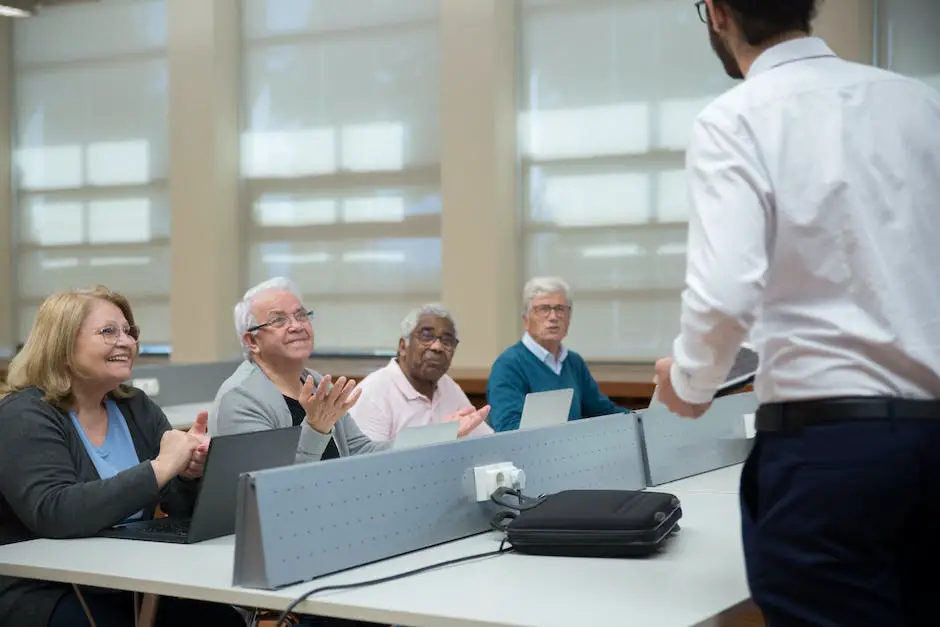Retirement Volunteering Opportunities 2024
As the sun sets on the working chapter of life, a new dawn rises beckoning retirees to repurpose their skills and passion through volunteerism. This vital transition not only redefines personal identity beyond professional realms but also strengthens the social fabric of communities. The intricacies of what motivates the modern retiree to donate their time, the profound impact such engagement can have on their well-being, and the broader economic and sociocultural effects are poised to redefine philanthropy. With demographic shifts painting a portrait of an experienced generation with time wealth, the year 2024 opens its doors to an unprecedented era of retired volunteers, eager to imprint their wisdom and energy upon the world in need.
Demographics and Motivations of Retiree Volunteering
The Allure of Volunteering: Unpacking the Motivations of the Retired Demographic in 2024
In contemporary society, the penchant for volunteerism among retired individuals has become an area of increasing significance and intrigue. The motivations propelling this demographic to dedicate their time and efforts, sans financial reward, provide insight into evolving societal trends and the shifting landscape of opportunity in 2024.
Unraveling the Motivations: Altruistic Endeavors and Beyond
Retirees embark on the path of volunteering for a multitude of reasons, each underscoring the diverse personal and social factors at play. Altruism, the selfless concern for the well-being of others, emerges as a foundational motivator. The desire to contribute to the community and make a tangible difference is amplified post-retirement, a period often earmarked by reflections on legacy and societal contribution.
Connection and Community: The Social Fabric of Volunteerism
Human beings are innately social creatures, drawn to settings that foster relationships and camaraderie. Post-retirement, volunteerism serves as an avenue for re-establishing social networks that might have weakened with the cessation of professional life. Engaging in volunteer activities offers the retired demographic a sense of belonging and connectivity, enhancing interpersonal bonds and community cohesion.
Purpose Redefined: Charting New Territories in Post-Work Life
The transition from a career-driven existence to retirement can precipitate a void in purpose and daily structure. Volunteerism presents a channel through which retirees can redefine their sense of purpose. Contributing through voluntary work provides meaningful engagement, allowing individuals to apply their accrued skills and knowledge in diverse contexts while exploring new areas of interest.
Health and Well-being: An Elixir for the Golden Years
The health benefits associated with volunteerism are not to be underestimated. Research indicates that engaging in voluntary services is correlated with improved physical and mental health, offering retirees a proactive strategy to combat the effects of aging. Pursuits that promote cognitive stimulation, physical activity, and emotional well-being are central to the active aging paradigm, encouraging retirees to remain vigorous participants in society.
Shaping Opportunities in 2024: The Volunteerism Landscape
The retirement of the baby boomer generation has led to a surge in available volunteer resources. Nonprofit organizations in 2024 are increasingly tailoring opportunities to align with the specific skills and preferences of the retired demographic. Customized roles that capitalize on the unique expertise of retirees are flourishing, spanning education, mentorship, healthcare, environmental conservation, and beyond.
Technological advancements have also played a pivotal role in shaping volunteer opportunities. Virtual volunteering, once a nascent concept, has burgeoned, enabling retirees to contribute irrespective of geographical constraints. 2024 witnesses a proliferation of platforms and programs that leverage technology, expanding the scope of volunteerism beyond traditional parameters.
The intersection of societal needs and the offerings of the retired demographic has also resulted in novel initiatives. Inter-generational programs, designed to bridge the gap between the young and the old, are on the rise, leveraging the wisdom and experience of retirees to mentor and guide younger generations.
In conclusion, the convergence of altruism, the search for community and purpose, along with the health benefits, orchestrates the motivations driving retired individuals toward volunteerism. As society evolves, so too do the opportunities that cater to this willing and capable segment of the population. The year 2024 marks a time where the nexus of individual aspirations and societal benefit aligns, creating a dynamic and robust environment for retirees to contribute to the fabric of our communities.

Benefits of Volunteering Post-Retirement
Volunteering as a Catalyst for Enhanced Wellbeing in Retirement
The act of volunteering in retirement emerges as a multifaceted beacon of wellbeing, shedding light on the profound health, social, and cognitive advantages for those who have transitioned from active employment to their golden years. Not merely a benevolent pastime, the participation in volunteer activities marks a significant contribution to the holistic wellness of retirees, offering a renewed sense of vitality and engagement in the ever-unfolding tapestry of life.
Physiological and Psychological Health Shaped by Altruistic Engagement
Engaging in selfless activities post-retirement is revealed as a source of physiological benefits. Regular participation in volunteer work correlates with decreased rates of depression, a prevalent concern in the aging population, while also moderating blood pressure and potentially extending longevity. This nexus between altruistic behavior and physiological health underpins a reciprocal dynamic: offering one’s time and wisdom to causes beyond oneself nourishes the physical vessel, crafting a nurturing loop of giving and receiving.
Cognitive Stimulation: A Mental Fortification Process
In tandem with physical health benefits, cognitive stimulation stands as a bastion for the aging mind. Volunteering challenges retirees to venture into diverse tasks that necessitate problem-solving, strategic planning, and continuous learning. This mental exercise, akin to rigorous cognitive training, is instrumental in maintaining brain plasticity and fending off the deleterious effects of aging on cognitive faculties. In essence, the act of volunteering functions as a gymnasium for the mind, where neurons are engaged and cognitive decline is kept at bay.
Social Integration and the Fabric of Community
From a social perspective, volunteering acts as a conduit connecting retirees with their communities, thereby fortifying social ties and creating a supportive network. Confronted with the specter of social isolation, retirees find solace and companionship through community engagement in volunteer roles. These social interactions, rich in empathetic exchanges and shared experiences, are essential in cultivating a sense of belonging and contributing to overall life satisfaction.
Research indicates that retirees engaged in volunteer activities report higher levels of psychological wellbeing. The social interactions inherent in volunteering serve not only to deepen existing relationships but also to establish new ones, fostering an environment where social engagement becomes the cornerstone of retiree life rather than a patchwork addition.
Cultivating Self-efficacy and a Sense of Agency
Moreover, volunteering empowers retirees with a formidable sense of self-efficacy. The realization that their actions have a tangible impact on the lives of others renews their sense of agency—a potent antidote to feelings of helplessness that may arise in the post-professional phase. This empowerment is not frivolous; it is a propelling force that rejuvenates the spirit and feeds into the virtuous cycle of activity and satisfaction.
The Path Forward for Volunteerism in Retirement
As society continues to recognize the multifaceted benefits of volunteerism for retirees, a deliberate shift towards inclusivity and accessibility of opportunities is paramount. The demand for structured volunteer programs that cater to the unique skills and desires of the retired population must be met with a corresponding supply, facilitated by governmental, non-profit, and community-based organizations.
In essence, the act of volunteering stands as a testament to the undying human spirit, a rekindling of purpose for those who have crossed the threshold of retirement. It is a celebration of life’s second act, a chapter where the confluence of health, social connection, and cognitive sharpness forms the cornerstone of a rich and fulfilling post-retirement life. Engaging in volunteer activities thus unfurls as a canvas upon which retirees paint the autumn of their years with strokes of vitality, camaraderie, and intellectual vibrancy, without the need for summary or conclusion—the benefits self-evident in the lived experiences of those who give.

Economic and Sociocultural Implications
The Socioeconomic Ripple Effects of Retiree Volunteering
At the nexus of aging demographics and civic engagement lies retiree volunteering, a social phenomenon with substantial ripple effects across economies and societies. Emeritus individuals often seek meaningful engagement as an extension of their active lives, resulting in an under-appreciated force that cascades benefits well beyond personal fulfillment.
Economic Advantages of Retiree Volunteering
Volunteering in retirement effects the economy in multifaceted ways. While volunteers do not receive monetary compensation for their work, their contributions have a quantifiable economic impact. Volunteerism can reduce the strain on public resources, as these altruistic endeavors frequently mitigate the need for government-funded services. Retired volunteers fill gaps in education, social services, and healthcare, delivering invaluable assistance that, if replaced with paid labor, would command hefty public or private sector investment.
Another dimension of economic influence pertains to the labor market. Retirees bring decades of professional expertise to their volunteer roles, enriching organizations with high-level skills at a nominal cost. This transfer of knowledge bolsters organizational capacity and augments productivity, ultimately stimulating economic growth. Additionally, the network and mentoring they provide to younger volunteers or beneficiaries can enhance workforce development, seeding future economic benefits.
Social Harmony and Capital
Beyond economics, retiree volunteers are catalysts for strengthening the social fabric. By fostering interpersonal connections, they build community cohesion, pivotal for social equilibrium. This reinforcement of social bonds is a pillar for the creation and maintenance of social capital. Retirees often engage with diverse groups, from young people to marginalized populations, bridging generational and cultural divides. This convergence of varied perspectives fosters mutual understanding and tolerance, key ingredients for a harmonious society.
Volunteerism also amplifies societal resilience. In times of crisis, such as natural disasters or community upheavals, retired volunteers are among the first to step forward. Their readiness to provide support, guidance, and counsel reinforces community solidarity and accelerates recovery processes. Through resilience-building, these volunteers not only contribute to immediate relief efforts but also to the long-term fortitude of communities.
Sustainability and Legacy
Reinforcing societal sustainability is another broader impact of retiree volunteerism. Engagement in environmental conservation and sustainability initiatives illustrates retirees’ forward-thinking commitments to safeguarding the planet for future generations. By directly involving themselves in activities ranging from local clean-ups to global advocacy, retired volunteers contribute important labor and voices to environmental causes, helping to shift collective behaviors towards more sustainable practices.
Moreover, volunteerism offers retirees an avenue for legacy-building. By dedicating time to causes and organizations that align with their values, retirees shape enduring contributions that persist beyond their involvement. This intangible aspect of retiree volunteerism — the creation of a personal and social legacy — has long-lasting bearings that permeate through generations, influencing norms, attitudes, and values.
Conclusion
In essence, retiree volunteering serves as a multi-layered social adhesive, bonding the fabric of economies and communities. Instilling financial efficiencies, bridging societal gaps, nurturing inter-generational rapport, and fostering a culture of proactive stewardship, retired volunteers are indispensable to the vitality of society and the economy. Although the individual acts of volunteering may be inconspicuous, the collective effort exemplifies a profound model of engagement that nourishes the bedrock upon which thriving communities are built. It is a testament to the power of agency and altruism in shaping a more cohesive and prosperous world for all generations.

Emerging Trends in Retirement Volunteerism
Emerging Trends Shaping the Future of Volunteer Opportunities for Retirees
In contemporary society, the landscape of volunteering for retirees is undergoing significant transformations. Reflecting these changes, a series of emerging trends are redefining the way retirees participate in volunteer work, creating innovative avenues for engagement, personal growth, and societal impact.
Digital Volunteerism: Bridging the Digital Divide
One trend gaining momentum is the prevalence of digital volunteerism. As retirees become increasingly tech-savvy, opportunities for remote volunteering have expanded. Projects ranging from online mentoring and tutoring to virtual administrative work for nonprofits allow retirees to contribute from the comfort of their homes. This not only transcends geographical barriers but also accommodates those with mobility limitations, ensuring inclusivity and wider participation.
Flexibility and Personalization in Volunteering
Another noteworthy trend is the shift towards more flexible and personalized volunteer experiences. Organizations are moving away from a one-size-fits-all model, recognizing the diverse interests and skills of retired volunteers. Options now include micro-volunteering, where individuals engage in short, ad-hoc tasks, as well as roles that can be adapted to match personal schedules, preferences, and physical abilities, ensuring a fulfilling and bespoke volunteer journey.
Skill-based Volunteering
Retirees today often seek roles that align with their professional expertise or life skills, leading to a surge in skill-based volunteering. Organizations prize retired professionals for their accumulated knowledge and experience. Whether it’s consulting for startups, teaching in areas of expertise, or offering pro bono services, these engagements provide intellectual stimulation and a sense of continued professional relevance.
Sustainable Development and Environmental Stewardship
Amid growing environmental concerns, a wave of retirees dedicate their time to sustainable development and conservation efforts. Activities like community gardening, wildlife habitat restoration, and climate advocacy are attracting those passionate about leaving a greener legacy. These roles not only encourage environmental consciousness but also provide physical activity and a connection with nature.
Global Volunteering and Cultural Exchange
With increased globalization, retirees have unprecedented access to international volunteer programs. These programs often focus on cultural exchange and capacity-building in developing regions. Participation in such initiatives enhances retirees’ global perspective and fosters cross-cultural understanding, enriching both the volunteers and recipient communities.
Volun-tourism
Combine travel with volunteer work, and you have “volun-tourism” – a trend that appeals to adventurous retirees looking to explore new locales while making a positive impact. These opportunities often involve working with local NGOs or community projects abroad, offering a unique blend of cultural immersion and charitable work.
Advocacy and Activism
Heightened social awareness has sparked an interest in advocacy and activism among the retiree demographic. Retirees are championing causes close to their hearts, using their voices and time to promote social change. From campaigning for policy reforms to raising awareness about social issues, retired activists are a powerful force for progress.
Educational Mentorship and Lifelong Learning
Retirees are increasingly involved in educational programs, serving as mentors, tutors, or participants in lifelong learning initiatives. These experiences not only impart wisdom to younger generations but also promote the retirees’ cognitive engagement and personal development.
Health and Wellness Outreach
Many retirees contribute to the wellness of their communities by volunteering with health-related organizations. This includes support groups, hospice care, and health education programs. By sharing their compassion and empathy, retirees enhance the lives of those in need while also benefiting from the nurturing relationships they build.
Resurgence of Local and Community-Based Volunteering
Finally, there is a resurgence of interest in local and community-based volunteering. Retirees are revitalizing neighborhoods by contributing to local libraries, museums, and community centers. Such involvement not only strengthens communal bonds but also fosters retirees’ sense of belonging and identity within their immediate surroundings.
These trends demonstrate the dynamic nature of volunteerism for today’s retirees. Beyond contributing to the community, these opportunities provide avenues for personal growth, fulfillment, and enrichment during the retirement years. By engaging in these diverse and evolving forms of volunteer work, retirees not only enhance their own lives but continue to leave an indelible mark on the fabric of society.

Strategies for Engagement and Retention in Volunteering
Engaging Retirees in Volunteerism: Effective Strategies for Participation and Retention
As the population ages and the cadre of retirees expands, understanding the strategies that effectively engage and keep these individuals involved in volunteer work is of paramount importance. The transition from decades of employment to retirement often brings a quest for meaningful pursuits. Many retirees find fulfillment and a sense of contribution through volunteerism. This article delves into the dynamics of engaging retirees and the most effective means of ensuring their continued participation in voluntary service.
Creating Tailored Volunteer Roles:
Volunteer roles must be crafted with the unique skill sets, interests, and physical capabilities of retirees in mind. Organizations can conduct interviews or surveys with retirees to ascertain their preferences and then design volunteer positions to match these details. For example, a retired teacher may relish the opportunity to mentor students, whereas a retired craftsman may prefer repairing items for a charity. Customizing roles enhances the satisfaction derived from volunteering, thus fostering long-term engagement.
Flexibility and Autonomy:
A key factor in retaining retiree volunteers lies in offering flexible scheduling options that accommodate their lifestyle. This generation may desire to balance volunteerism with leisure, travel, and family commitments. Providing a sense of autonomy, where retirees can select their hours or choose short-term projects, can lead to higher rates of satisfaction and retention. Flexibility demonstrates respect for their time and autonomy, which aligns with their desire for self-directed engagement in this phase of life.
Social Opportunities and Networking:
Retirees often seek social interaction and opportunities to forge new relationships. Facilitating volunteer environments that promote socialization can appeal to their need for connectedness. Volunteer events, social outings, and recognition programs create a community atmosphere that can be very attractive to retirees. These social frameworks not only promote a sense of belonging but also become an incentive to continue participating in volunteer activities.
Constructive Feedback and Recognition:
Recognizing the contributions of retiree volunteers can solidify their commitment to an organization. This cohort, emerging from careers where achievements were acknowledged, will likely respond well to appreciation. Thoughtful feedback and recognition can take the form of formal awards, acknowledgment in newsletters, or celebratory events. Such gestures validate their work and reinforce the value they bring to the community and the organization.
Ongoing Support and Training:
Supporting retiree volunteers with ongoing training and resources empowers them to contribute effectively. As some retirees might be apprehensive about the use of technology or new processes, offering workshops or one-on-one sessions can boost their confidence and capability. Continual learning opportunities align with the retirees’ desires for cognitive stimulation and personal growth, ensuring their volunteer experience is both rewarding and developmental.
Health and Wellness Integration:
Volunteer roles that incorporate physical activity or mental health awareness cater to retirees’ need for health maintenance. Nature conservation projects or roles that encourage light physical activity can appeal to those who wish to stay active. Similarly, volunteer positions that promote mindfulness or stress reduction can be particularly engaging, contributing to their holistic wellbeing.
Providing Purpose and an Impactful Legacy:
Programs that emphasize the impact of volunteers on future generations resonate with retirees’ desire to leave a lasting legacy. Roles that allow them to shape societal outcomes, such as advocacy for climate change or educational reform, give a sense of lasting purpose. Connecting their efforts to real-world effects underlines the importance of their role and inspires ongoing participation.
Conclusion:
The strategies for engaging and retaining retirees in volunteerism are diverse yet interconnected. They must address retirees’ quest for meaning, desire for social connectivity, need for respect and recognition, and the fulfillment derived from contributing to the well-being of society. Effectively implemented, these strategies not only enrich the lives of retirees but also harness their invaluable experience and skills for community benefit, creating a mutually reinforcing cycle of engagement and fulfillment.

The tapestry of retiree volunteerism is complex and ever-evolving, woven from the threads of human compassion, societal need, and the pursuit of purpose during the golden years. As the paradigm of retirement morphs under the influence of technological advancements and societal changes, the future of this altruistic endeavor is as promising as it is essential. By investing in strategic engagement that resonates with the core of retired individuals’ values and experiences, society can not only elevate the spirit of these volunteers but also harness their potential to leave an indelible mark on the fabric of community life. The year 2024 stands on the cusp of a revolution in retiree volunteerism, ready to embrace the full spectrum of possibilities that await in the collective pursuit of a better world for generations to come.



Leave a Reply